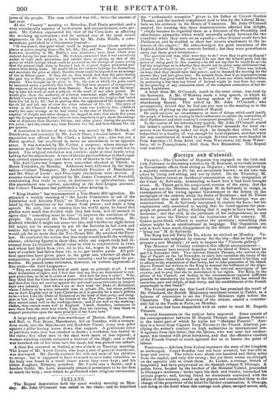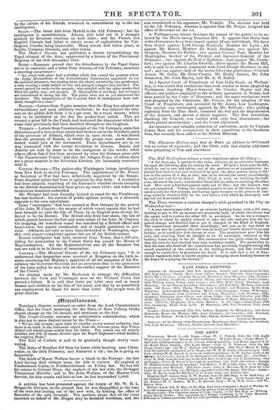goreign anb (Colonial.
FRANCE.—The Chamber of Deputies was engaged on the 14th and 15th February in discussing a motion by M. Remusat, to exclude persons in Government offices from sitting as Deputies ; which was rejected by a majority estimated at 30, but not accurately known • as the vote was taken by rising and sitting, and not by ballot. On the Thursday, M. Odillon Barrot raised an incidental conversation on the resignation of the Count de Salvandy, demanding to know how it had been brought about. M. Thiers gave his conjectural version of the story, that the King, and not the Minister, had obliged M. de Salvandy to resign, in. consequence of his voting against Government in the debate on the paragraph of the address about the Duke of Bordeaux ; and M. Thiers maintained that such direct interference by the Sovereign was un- constitutional. M. de Salvandy interposed to explain the facts : but his explanation only amounted to saying that he voted against the para- graph on grounds of policy, thinking that it ought to have been 'more moderate ; and that still, in the plenitude of his independence, he was there to serve the Throne and the institutions of his country. Pg. Guizot point-blank refused to answer the questions ; remarking that silence might be as constitutional as language. The Opposition are. said to have been much disappointed by the failure of their attempt to "bring out" M. de Salvandy.
The King has left Paris for Eu, where he arrived on Monday. Va- rious reasons are assigned by rumour for the trip—that he has gone tee prepare a new Ministry ; or only to inspect the "Victoria gallery." The Moniteur of Monday contained this official announcement--
" Government have received despaches from the island of Tahiti, dated if and 9th November 1843. Vice-Admiral Dupetit Thouars, who arrived in the Bay of Papaiti on the 1st November, to carry into execution the treaty of the 9th September 1842, which the King had ratified, had deemed it his duty not to adhere to the stipulations of that treaty, but to take possession of the island. Queen Pomare has written to the King to demand the fulfilment of the stipu- lations of the treaty, which assured to her the internal sovereignty of her country, and to pray that she be maintained in her rights. The King, by the. advice of his Council, not finding in the circumstances reported sufficient.
grounds for abandoning the treaty of the 9th September 1842, has ordered the execution, pure and simple, of that treaty, and the establishment of the Frencla protectorate in that island."
The French papers say that Lord Cowley has promised the recall of Mr. Pritchard, the British Missionary-merchant-consul in Tahiti, as a balance of concession to set the French Ministers right before the Chambers. The official disavowal of the seizure caused a consider- able fall in the Funds at Paris, on Monday.
A corvette had been despatched with an order to recal M. Dupetit. Thouars.
Several documents on the subject have appeared. Some consist of the correspondence between M. Dupetit Thouars and Queen Pomare ;- in the latter part of which he styles her "Madame Pomare." Ano- ther is a letter from Captain Toup Nicolas to the French Admiral, jus- tifying the writer's conduct on high authorities in international law. It appears from this letter, that the Queen, who was near her confine- ment, was treated with great harshness, and that the offensive conduct of the French Consul so much agitated her as to hasten the pains of labour.
Ponrccar..—Advices from Lisbon represent the state of the kingdom. as unchanged. Count Bomfim had not been arrested, but was still at large and active. The rebels were about one hundred and thirty miles from the capital, and only 600 strong ; but yet there seems no strength on the opposite side to crush them. At Lisbon, a strange breach of hospitality had been perpetrated on the Spanish refugee S. Olozaga. A police force, headed by the brother of the Minister Cabral, proceeded to Olozaga's residence ; broke open his desk and trunks, ransacked his private papers ; and, having found no documents connected with the affairs of that country, sealed up his papers and committed them to the charge of the proprietor of the hotel for further examination. S. Olozaga, not being at the hotel when this outrage took place, escaped arrest, and. by the advice of his friends, remained in concealment up to the last intelligence.
SPAIN.—The latest date from Madrid is the 22d February; but the intelligence is unsatisfactory. Alicant still held out in a struggle
marked by ferocious cruelties on both sides ; and the French and English Consuls had failed to obtain terms of capitulation for Car- thagena, Concha being inexorable. Many arrests had taken place, at Seville, Corunna, Grenada, and other towns.
The Madrid Gazette has published a decree refistablishing the Papal tribunal of the Rota, suppressed by a decree of the Provisional Regency of the 29th December 1840.
Roms.—Rumours prevail that the disturbances in the Papal States are to be renewed ; and a letter from Ancona, of 6th February, mentions a startling occurrence-
" An event took place here yesterday which has caused the greatest alarm. As Judge Alessandrini, of the Extraordinary Commission appointed to try the political prisoners, was passing down the street, escorted by two gendarmes, a man wearing a mask rushed on him and plunged a dagger into his back. The crowd opened its ranks to the assassin ; who mingled with the other masks that filled the public way, and escaped. M. Alessandrini is not dead, but no hopes are entertained of saving his life. The police have not as yet discovered the murderer. The amusements of the Carnival have in consequence been sud- denly brought to a close."
NAPLES.—Letters from Naples mention that the King has adopted an extraordinary and most arbitrary resolution : he has reduced the inte-
rest on the public debt from 5 to 4 per cent, by a royal decree, which was to be published on the day the packet-boat sailed. This act created a great fall in the Funds, and increased the discontent which for some time previously had been manifest throughout the kiugdom.
TURKEY.—Letters from Constantinople of the 7th February, state that disturbances of a very serious nature had broken out in the Northern parts
of the province of Albania, which were in open revolt. It was feared that the province of Bosnia, in which the people were much discon- tented, would join in the movement. These disturbances are in no way connected with the recent revolution in Greece. Russia and Austria are said by some to be the instigators of the revolt ; while others affirm that it has been produced by what the German press calls " the Pansclavonic Union," and that the refugee Poles, of whom there are a great number in the Sclavonic districts, are intimately connected with it.
UNITED STATES.—The packet-ship Washington brings intelligence from New York to the 9th February. The appointment of Mr. Porter as Secretary at War had been definitively negatived by the Senate. Some disputed points had been in agitation by that body. A resolution had been adopted, inquiring of the Executive whether slaves escaping to the British dominions had been given up since 1842; and other such resolutions remained undecided.
Mr. Webster had been formally invited to stand for the Presidency, but had declined ; the current of public opinion setting in a direction opposite to his own convictions.
Some " excitement " had been created at New Orleans by the arrival of the John M. Clayton ; the master of which vessel reports that he had
been brought to, near the Isle of Pines, by an English man-of-war, be- lieved to be the Hornet. The British ship fired four shots, the last of which passed between the fore and main-masts of the John M. Clayton.
On stopping, the American vessel was searched by a British officer and boat's-crew, her papers overhauled, and at length permitted to pro- ceed. Affidavits are said to have been forwarded to Washington, toge- ther with urgent complaints against this act of the British cruiser.
Recent intelligence had been received from Texas, that a bill pro- viding for annexation to the United States has passed the House of Representatives. All the Representatives and all the Senators but one are said to be in favour of annexation.
CANADA.—The Montreal Gazette of the 1st February says, "It is understood that despatches were received at Kingston on the 24th in- stant, conveying her Majesty's approval of all the measures of his Ex- cellency the Governor-General, and an assurance that in the pursuance of the same policy he may rely on the cordial support of the Ministers -of the Crown."
An attempt made by Mr. Buchanan to arrange the difficulties between the Cork and Connaught men on the Welland Canal had proved a failure. It is said that there are 5,000 men and as many women and children on the line of the canal, and that by no possibility can employment be fouud for more than 3,000. The people were in great distress.



























 Previous page
Previous page